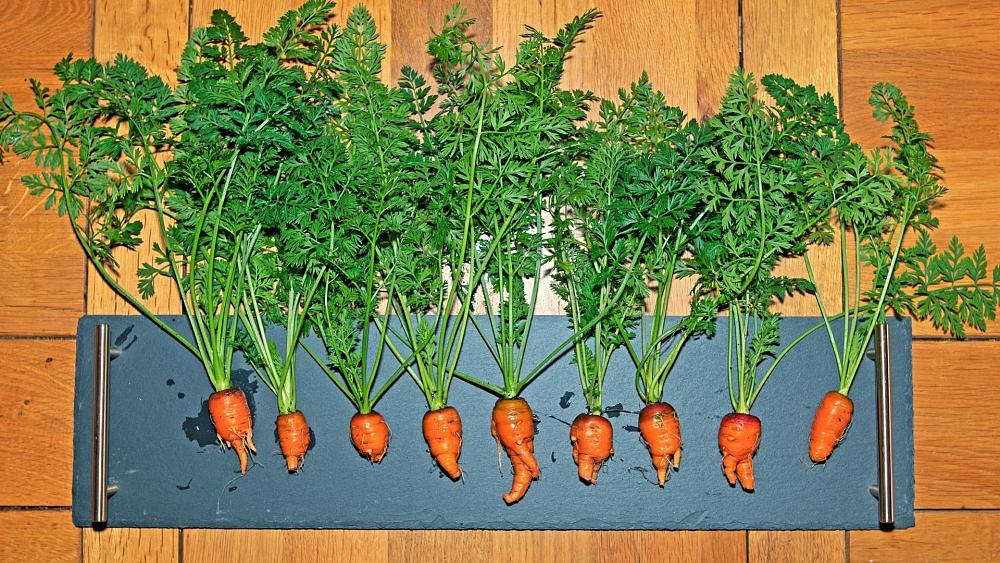To prevent infections on newly propagated plants, one farmer rubs fluids from aloe vera plants on the exposed surface of the grafted plant.
Climate change has become a significant threat to Nigeria’s food security amidst worsening insecurity and food inflation.
To deal with this problem, some farmers in rural Abuja communities and across the different regions of the country have adopted sustainable agricultural practices, commonly called smart agriculture, in an effort to mitigate the devastating impacts of climate change on food production, boost biodiversity and as well restore degraded lands.
“Because we understand the implication of pesticides usage on crops, and the environment, we only make use of organic fertiliser which are mostly extracts from plants here to control pests and diseases,” Samuel Kwasari, an agroforestry farm manager at Kwali area council in Abuja, told PREMIUM TIMES.
He said when he started farming at his current farm, the soil was sandy, brownish and the land was degraded. Because they make use of organic fertilizer, there are earthworm mounds around, indicating the presence of essential nutrients for plants which was lacking before.
“Turn your back and see the soil by the road, totally brown. That was how it was when we came here, but see it today, it is totally different,” the farmer said.
Worm castings are explained as small mounds or bumps on the lawn that are basically worm excrement–but highly nutritious excrement. These excretions are nutrient-packed remains of digested plant matter and soil that have passed through the worms–a material that is extremely beneficial to the lawn.
Earthworm’s presence due to organic usage of manure also helps in breaking down thatch, increasing decomposition, and creating usable nitrogen in the soil.
To prevent infections on newly propagated plants, Mr Kwasari said he rubs fluids from aloe vera plants on the exposed surface of the grafted plant in order to reduce bacterial load on the crops.
“This practice has helped improve the soil microbial organisms, soil texture, nutrients and water retention capacity, as well as plant vigor to sequester carbon dioxide conveniently,” the farmer said.
How does this work?
Mr Kwasari explained that apart from growing crops that repel pests and diseases from crops planted, he said they also make use of extracts from neem plants (commonly called dongoyaro tree), eucalyptus, cow dung and urine combinations to treat infected plants.
“Because we don’t apply fertilizer, we make use of cow urine, cow dung, soil, pigeon pea or any other pea with high protein. What we do is that we take 200 liters of water, 10 liters of cow urine, a kilogram or 2kg of fresh cow dung, 1kg of powdery pigeon pea and a handful of soil, then mix them together,” he said.
The farmer said the idea behind adding a handful of soil is to multiply the available microorganisms.
For instance, he said, “Let’s assume as I pick up a handful of soil there are 10 microbes in it. After fermenting the concoction, there will be about 2000 microbes in the 200 litres of mixture. Then we just apply it on the farm then it keeps multiplying the microbes.”
One of the critical needs of plants is that the microbes are there, the soil is living. It needs air just like humans and the trees. It is a natural thing that if there’s a tree growing on a soil that air will get there. As trees take up the carbon dioxide, it is only through the soil that they can sequester it.
Peter Ikwu, another agroforestry farmer, said he grows marigold plants alongside his vegetables in order to prevent pests from invading his crops, rather than using toxic chemical sprays on his farm.
Marigolds are a favorite, no-fuss annual plant that can bring the color of sunshine to the garden. Because it is brightly coloured, it easily attracts insects to itself including beneficial insects like butterflies, bees, ladybugs, among others which helps in pollinating flowering plants on the farm.
Marigold seeds germinate quickly, within just a few days, and blooms within eight weeks. This quick sense of satisfaction makes them a great first-time gardening project and a great companion in vegetable gardens which can help protect veggies from predators and pests.
“With this system of farming we don’t need to depend on chemicals like our parents does… ” Mr Ikwu said.
According to the farmers, food crops are grown strategically alongside trees and the insect repellant plants in order to create mutual benefits for both crops and the environment.
For instance, because leguminous crops such as beans, groundnut and even Gliricidia trees are known to be good fixers of atmospheric nitrogen into the soil, of which nitrogen is an essential nutrient required by plants to thrive and blossom.
These legumes are seen to be inter-cropped with maize, sorghum among other crops so as to boost yields without further fertiliser applications, while pests repellent plants (marigolds) are evenly spread along the rows where crops are planted.
Organic pesticides and fertiliser formulations
Mustapha Yakubu, who heads the nursery unit of the Be the Help Foundation agroforestry farm, explained that a smallholder farmer can easily prepare their organic pesticides and fertiliser with leaves from neem plant, pepper, cow urine, cow dung, pigeon pea, sand and water.
He said a farmer can prepare organic pesticides by blending the leaves of neem plants alongside pepper, cow urine and water, then allow the mixture to ferment for three days before sprinkling it on the farm.
Mr Yakubu said for the preparation of the organic manure, a farmer should mix 5kg each of ripe banana, pigeon pea, fresh cow dung, then top it with 10 liters of cow urine, a handful of soil from the farm and water.
“After mixing all of this in a drum, the mixture should be stirred both clockwise and anti clockwise for 20 times then allowed to ferment for 23 days before use on the farm,” he said.
Key significance and challenges
Zilolo Emasealu, an Agronomist with the Nigeria Farmers Group and Cooperative Society(NFGCS), said organic farming is indeed a healthy way of growing edible crops and vegetables but that Nigeria does not have a strong organic market yet for farmers to explore.
He said for a farmer to successfully run an organic farm, then the farmer needs to prevent run-offs from other farms from passing through, thus there is a need for a bigger buffer zone.
“Usually, running an organic farm on a large scale is more tedious and expensive,” the agronomist said.
Tosin Olonijolu, farm manager and principal agric officer at the Lower Niger river Basin Development Authority’s integrated farm, said the usage of extracts from neem and eucalyptus trees, alongside livestock wastes to combat pests and diseases on farmlands can be traced to India and even Brazil.
He said organic systems of farming helps to promote healthy food production with available materials within the farm environment.
Get the latest in African news delivered straight to your inbox
By submitting above, you agree to our privacy policy.
Almost finished…
We need to confirm your email address.
To complete the process, please follow the instructions in the email we just sent you.
There was a problem processing your submission. Please try again later.
Pesticides and climate change
While agricultural pesticides usage has been linked to be major drivers of climate change effects, some farmers across the world have switched to taking the opportunity to embrace the principles of regenerative agriculture in order to reduce pesticide use, improve soil health, and increase the capacity of soil to retain water and sequester carbon.
According to the United Nations-backed Intergovernmental Science-Policy Platform on Biodiversity and Ecosystem Services (IPBES), nutrient run-off from farms laced with synthetic fertilizer has adversely affected land ecosystems.
“Along with flood, drought and fire, add pests to the list of anticipated impacts of climate change. With a longer growing season and a warmer climate, weeds and insect pests will proliferate, most likely leading to more pesticide use – which is itself responsible for harmful emissions that further exacerbate climate change,” said a report by the California for Pesticides Reform (CPR) said.
Meanwhile, the United Nations Environment Programme said a recent study from a United Kingdom-based charity soil association and advocate of organic farming, has shown that organic farming methods are not the only example of sustainable nutrient management, noting that agroecological approaches, including conservation, low-input, and minimum tillage agriculture, are all recognized as “nature-positive” and regenerative practices.
It said an enormous share of human-induced greenhouse gas emissions result directly or indirectly from agricultural production and the subsequent processing, storage, transport and disposal of food.
This story was produced under the 2021 Solution Journalism Africa fellowship of the Solution Journalism Network.
Read the original article on Premium Times.
AllAfrica publishes around 700 reports a day from more than 100 news organizations and over 500 other institutions and individuals, representing a diversity of positions on every topic. We publish news and views ranging from vigorous opponents of governments to government publications and spokespersons. Publishers named above each report are responsible for their own content, which AllAfrica does not have the legal right to edit or correct.
Articles and commentaries that identify allAfrica.com as the publisher are produced or commissioned by AllAfrica. To address comments or complaints, please Contact us.
AllAfrica is a voice of, by and about Africa – aggregating, producing and distributing 700 news and information items daily from over 100 African news organizations and our own reporters to an African and global public. We operate from Cape Town, Dakar, Abuja, Johannesburg, Nairobi and Washington DC.
Get the latest in African news delivered straight to your inbox
By submitting above, you agree to our privacy policy.
Almost finished…
We need to confirm your email address.
To complete the process, please follow the instructions in the email we just sent you.
There was a problem processing your submission. Please try again later.
Nigeria: How Abuja Farmers Use Organic Pesticides, Disease Control to Reduce Climate Change Effects – AllAfrica.com





